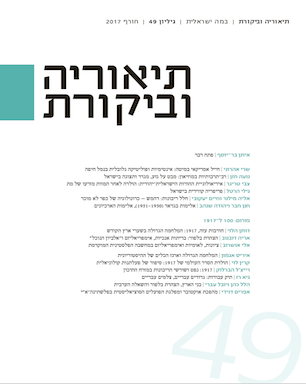On Vertical Alliances, Informal Imperialism, and “Perfidious Albion”: Reflections on the Balfour Declaration Centennial
Arie M. Dubnov
Much has been written over the years about the origins of the Balfour Declaration. Little has been said, however, about the manner in which the Declaration turned into a key political tool after 1917, and the various ways in which it was understood in Zionist writing and historiography in pre-statehood years. The basic proposition of this article is that the series of interpretations, explanations and historical readings of the Balfour Declaration should be integrated into the history of its reception. In particular, given the fundamental conceptual ambiguity that stood at the heart of the Declaration, the article highlights the unique political dynamic that developed from an early stage, marked by an "interpretive struggle" between those who sought to offer broad interpretations of the Declaration versus the more minimalist interpreters.
Next, the article offers a threefold argument: first, it proposes to embed the story of the Declaration in the conceptual framework proposed by Yosef Haim Yerushalmi, known as the "vertical alliances" thesis. Such a historical reading, the article suggest, enables us not to divorce the story of the Declaration from the history of modern Jewish politics, contrary to the readings of Zionism as a meta-historical break or revolution. At the same time, this reading allows us to situate the story of the Declaration within the chronicles of British imperial history – and, in particular, to regard it as part of the process in which techniques of informal imperialism were developed and implemented. This perspective, the article shows, was not alien to the early Zionist writers, and it was not until the 1940s, with the rise in the popularity of a Jewish version of the "Perfidious Albion" narrative, that this view began to be challenged.
The article, moreover, seeks to explain why the Declaration was pushed to the margins of collective memory after 1948. It does so by drawing on the recent work of literary scholar Uri S. Cohen, who traces the formation of an Israeli literary paradigm – dubbed the “security style” –and shows how it veiled the colonial past in which Israel’s early security organizations were formed. The rise of this paradigm, the article argues, explains much of the vanishing of the vertical alliance from the popular memory and discourse.
Finally, exposing some of the theoretical assumptions underlying the “security style” – namely, the presupposition that the return of Jews to politics is impossible without the creation of an autonomous Jewish fighting force – the article argues that these were not unique to Zionist authors and can also be found, as paradoxically as it may sound, in Hannah Arendt’s writings from the early 1940s, at the very same time she distanced herself from the Zionist


